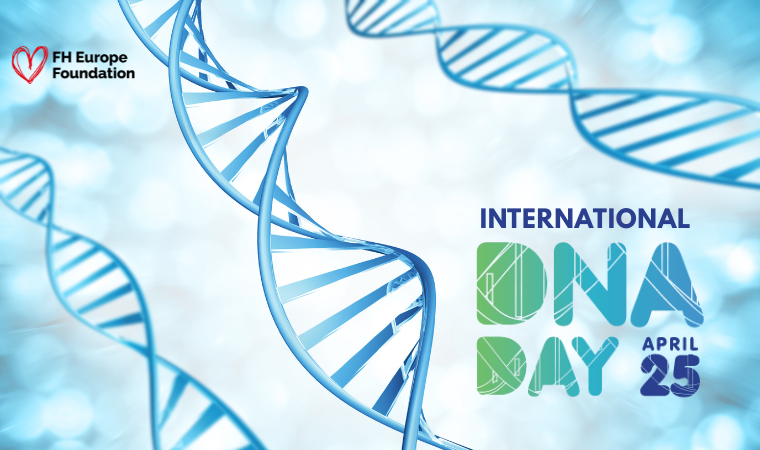
This year marks the 13th Anniversary of World DNA Day (WDD-2025) and the celebration of National DNA Day on April 25th. The 2025 theme – “Unlocking the Power of Gene” – underscores the transformative role of genetics in shaping the future of healthcare.
Unlocking the power of genes is crucial for individuals living with inherited lipid conditions such as familial hypercholesterolaemia (FH), familial chylomicronaemia syndrome (FCS), elevated lipoprotein(a) [Lp(a)], and homozygous familial hypercholesterolaemia (HoFH). Genetic research and testing play a vital role in identifying, treating, and preventing these conditions, leading to better health outcomes and improved quality of life.
On this International DNA Day, we are thrilled to highlight the incredible collaboration of the FH Europe Foundation and European Projects, in advancing the diagnosis and treatment of familial hypercholesterolaemia (FH). This day commemorates the discovery of DNA's double helix and the completion of the Human Genome Project, both pivotal moments in genetic research.
To further illustrate this progress, we’re proud to showcase several FH Europe Foundation-led European projects that are driving innovation in the early detection and personalised care of FH and related conditions:
FH EARLY Project: A groundbreaking initiative aimed at revolutionising the early diagnosis and co-management of FH. Supported by Horizon Europe, this project brings together experts from across Europe to address the urgent needs of FH patients through innovative solutions.
PERFECTO: Preventing the Preventable – Familial Hypercholesterolaemia Paediatric Screening for Cardiovascular Health. This landmark initiative focuses on personalised prevention, tackling the often-overlooked genetic cause of cardiovascular disease through social innovation. PERFECTO aims to implement FH paediatric screening across Europe, generating evidence that supports early intervention and prevention strategies.
PerMedFH: Personalising diagnosis and treatment for FH patients. This project focuses on tailoring healthcare strategies to individual genetic profiles, ensuring more effective and targeted interventions. By identifying specific genetic variants, PerMedFH hopes to enable personalised care that addresses the unique needs of each patient, improving treatment outcomes and reducing the risks to individuals.
Beyond FH, unlocking the power of genes has meaningful implications for other inherited lipid conditions as well. Let’s take a closer look at how genetic testing supports identification and management for FCS, HoFH, elevated Lp(a) and HeFH.
For more information about FCS and the impact it has – watch FH Europe Foundations webinar:
You can find more patient stories and updates on our website and YouTube channel.
Why genetics plays such a big role for HoFH:
Learn more about HoFH and the role of genetics in treatment through our awareness day trilogy:
FH Europe Foundation also brought experts to the table that shows that testing for genetic conditions is cost effective both in monitory value and people's lives:
Understanding the difference that a genetic variant can make:
As we celebrate International DNA Day on April 25th, we also look forward to HoFH Awareness Day on May 4th. HoFH Awareness Day underscores the importance of resilience and strength, echoing the themes of overcoming adversity. By linking these two significant days, we highlight the critical role of genetic research in understanding and managing HoFH. Early genetic screening and diagnosis are vital in preventing severe cardiovascular events and improving the quality of life for those affected by HoFH.
Join us in celebrating the power of genetic research and the strides we are making towards a healthier future for all. Together, we can make a difference! 💙
Read more about World DNA Day here.